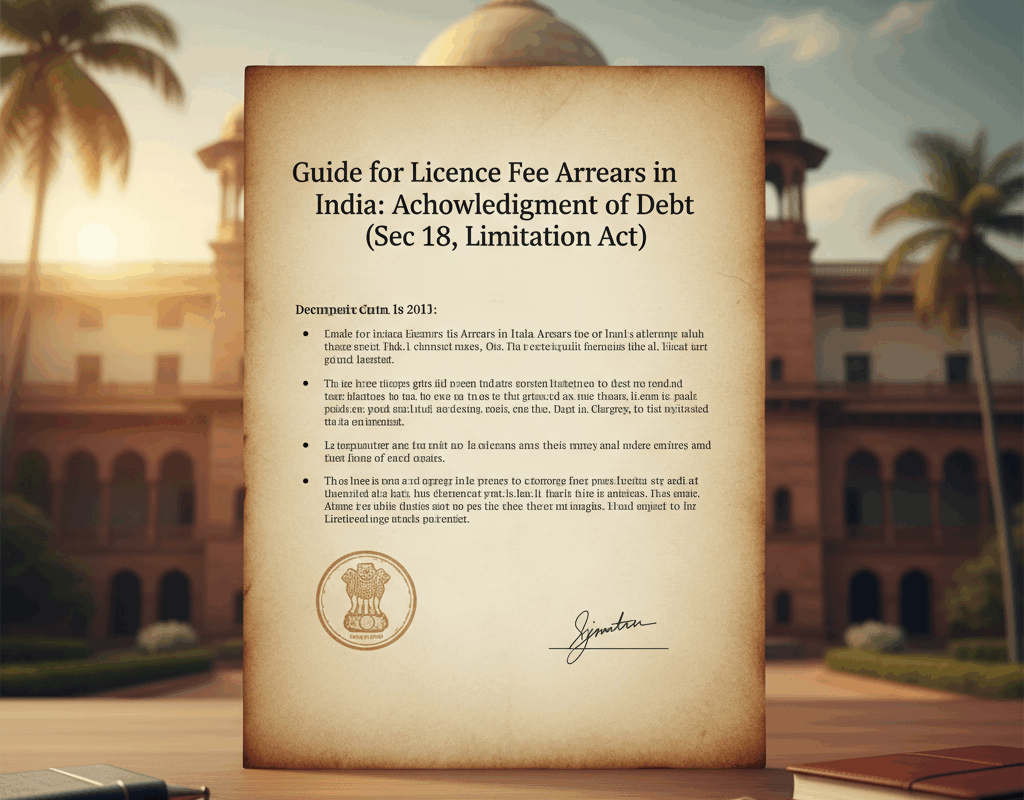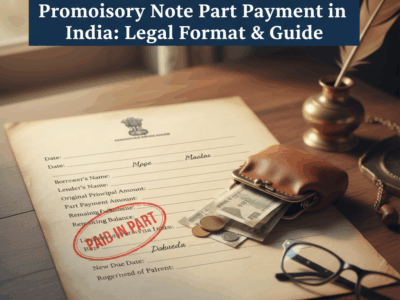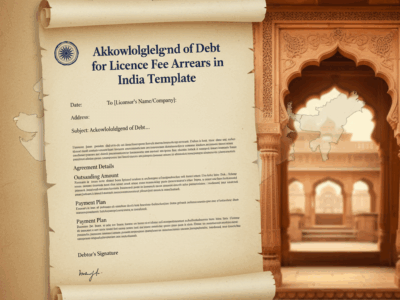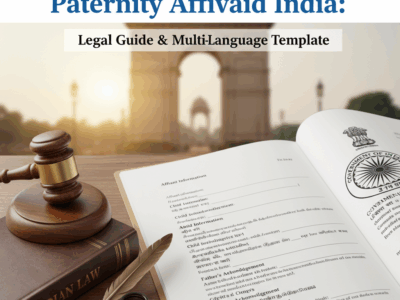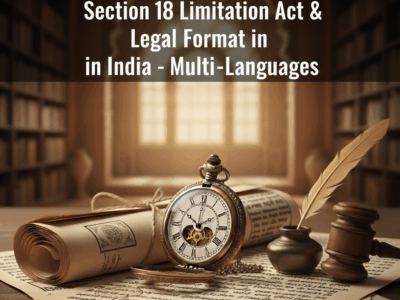Are you struggling to recover unpaid licence fees in India and worried about the three-year limitation period expiring? A strategically obtained Acknowledgment of Debt is your most powerful legal instrument. Under Section 18 of the Limitation Act, 1963, a valid acknowledgment can reset the legal clock, preserving your right to recover dues that would otherwise become a time-barred debt.
This comprehensive 2025 guide breaks down everything licensors and licensees need to know. We will explore the critical components of a valid acknowledgment, provide ready-to-use legal formats in English, Hindi, Tamil, and other regional languages, and analyze landmark case law. Furthermore, we’ll cover crucial practicalities like stamp duty requirements, corporate signatory authority, and common pitfalls to avoid, ensuring your claim remains legally enforceable.
A Guide to Acknowledgment of Debt for Licence Fee Arrears
Updated: October 14, 2025
Executive Summary
This guide provides a comprehensive legal and practical analysis of the 'Acknowledgment of Right to Arrears of Licence Fees' under Indian law. This document is a potent legal instrument for navigating the Indian Limitation Act, 1963. Its primary purpose is to secure a formal admission of liability from a licensee *before* the statutory period to recover the debt expires, effectively resetting the limitation period and preserving the licensor's right to pursue legal action.
I. The Legal Imperative: Understanding Limitation in Indian Law
The need for an 'Acknowledgment of Right to Arrears' is rooted in a core principle of India's legal system: the law of limitation. Legal remedies aren't available forever and must be sought within a specific timeframe. For a licensor, failing to act can mean losing the right to recover unpaid fees.
Core Maxim:
"Vigilantibus non dormientibus jura subveniunt" — the law assists the vigilant, not those who sleep on their rights.
The Limitation Clock Infographic
For most monetary claims, like licence fee arrears, the limitation period is three years from the date of default. After this, the claim becomes "time-barred."
The Race Against Time
Once the three-year period elapses, the licensor's claim becomes time-barred. The right to the money still exists, but the legal *remedy* (the ability to sue) is lost. An acknowledgment of debt is the key to resetting this clock.
II. The Anatomy of a Valid Acknowledgment (Section 18)
The legal power of an acknowledgment comes from Section 18 of the Limitation Act, 1963. To be valid and reset the limitation period, it must satisfy four essential conditions. The acknowledgment need not be a formal document; it can be inferred from balance sheets, letters, or even emails, as long as it unequivocally admits a subsisting jural relationship of debtor and creditor.
1. In Writing
Oral admissions are not enough. It must be a written document, email, or even an entry in a balance sheet.
2. Signed by Liable Party
Must be signed by the licensee or a duly authorized agent. Authority is key for corporate entities.
3. Made Before Expiry
This is a strict requirement. The acknowledgment must be signed *before* the original 3-year period ends.
4. Admits Liability
The document must clearly admit a "present subsisting liability." It doesn't need to state the exact amount or promise to pay.
Interactive Chart: The Effect of Acknowledgment
A valid acknowledgment gives the licensor a fresh period of limitation, starting from the date the document is signed.
III. Judicial Lens: Landmark Case Law
The interpretation of Section 18 has been shaped by numerous Supreme Court and High Court judgments. These cases provide crucial clarity on what constitutes a valid acknowledgment.
Food Corporation of India v. Assam State Cooperative Marketing & Consumer Federation Ltd. (2004)
"An acknowledgment must be a conscious admission of liability. A mere statement of fact which is not intended to be an admission will not operate as an acknowledgment."
Key Takeaway: Intent matters. The document must clearly show the debtor's intention to admit the debt.
Asset Reconstruction Company (India) Ltd. v. Bishal Jaiswal (2021)
"An entry made in the company's balance sheet can amount to an acknowledgment of liability within the meaning of Section 18 of the Limitation Act."
Key Takeaway: Corporate financial statements can serve as legally valid acknowledgments, a critical point in commercial disputes.
IV. Legal Format: Multilingual Templates
Below is a standard draft format for an "Acknowledgment of Right to Arrears of Licence Fees" in multiple languages. Always adapt the template to your specific circumstances and consult a legal professional.
ACKNOWLEDGMENT OF RIGHT TO ARREARS OF LICENCE FEES
I, ____________________________, S/o Mr. ____________________, Resident of ____________________________________________________ hereby acknowledge that I owe to Mr. ________________________________________, S/o Mr.____________________________________, Resident of ________________________________________________________________________________ as arrears of licence fees from ____________ to _________ under a Licence Agreement dated _____________ in respect of the property described as ………………………………..……………. situated at __________________________.Dated: ____________(Signed) _______________________ Name: _________________________ Address: _______________________
लाइसेंस शुल्क के बकाया के अधिकार की पावती
मैं, ____________________________, पुत्र श्री ____________________, निवासी ____________________________________________________ एतद्द्वारा स्वीकार करता हूं कि मैं श्री ________________________________________, पुत्र श्री____________________________________, निवासी ________________________________________________________________________________ को दिनांक _____________ के लाइसेंस समझौते के तहत ____________ से _________ तक लाइसेंस शुल्क के बकाया के रूप में, संपत्ति ……………………..……………. स्थित __________________________ के संबंध में, भुगतान करने के लिए ऋणी हूं।दिनांक: ____________(हस्ताक्षरित) _______________________ नाम: _________________________ पता: _______________________
লাইসেন্স ফি বকেয়া حقوقের স্বীকৃতি
আমি, ____________________________, পিতা শ্রী ____________________, বাসিন্দা ____________________________________________________ এতদ্বারা স্বীকার করছি যে আমি শ্রী ________________________________________, পিতা শ্রী____________________________________, বাসিন্দা ________________________________________________________________________________ কে, _____________ তারিখের লাইসেন্স চুক্তির অধীনে ____________ থেকে _________ পর্যন্ত লাইসেন্স ফি-র বকেয়া হিসাবে, ……………………..……………. অবস্থিত __________________________ সম্পত্তির জন্য ঋণী।তারিখ: ____________(স্বাক্ষরিত) _______________________ নাম: _________________________ ঠিকানা: _______________________
உரிமக் கட்டண பாக்கிகளுக்கான உரிமைக்கான ஒப்புதல்
நான், ____________________________, தகப்பனார் திரு. ____________________, வசிக்கும் இடம் ____________________________________________________ இதன்மூலம் நான் திரு. ________________________________________, தகப்பனார் திரு.____________________________________, வசிக்கும் இடம் ________________________________________________________________________________ அவர்களுக்கு, _____________ தேதியிட்ட உரிம ஒப்பந்தத்தின் கீழ், ____________ முதல் _________ வரை உரிமக் கட்டணப் பாக்கிகளாக, ……………………..……………. அமைந்துள்ள __________________________ சொத்து சம்பந்தமாக செலுத்த வேண்டியுள்ளது என்பதை ஒப்புக்கொள்கிறேன்.தேதி: ____________(கையொப்பம்) _______________________ பெயர்: _________________________ முகவரி: _______________________
లైసెన్స్ ఫీజు బకాయిల హక్కు యొక్క అంగీకారం
నేను, ____________________________, తండ్రి శ్రీ ____________________, నివాసి ____________________________________________________ దీని ద్వారా నేను శ్రీ ________________________________________, తండ్రి శ్రీ____________________________________, నివాసి ________________________________________________________________________________ గారికి, _____________ తేదీ గల లైసెన్స్ ఒప్పందం ప్రకారం, ____________ నుండి _________ వరకు లైసెన్స్ ఫీజు బకాయిల రూపంలో, ……………………..……………. చిరునామాలో ఉన్న __________________________ ఆస్తికి సంబంధించి రుణపడి ఉన్నానని అంగీకరిస్తున్నాను.తేదీ: ____________(సంతకం) _______________________ పేరు: _________________________ చిరునామా: _______________________
परवाना शुल्काच्या थकबाकीच्या हक्काची पोचपावती
मी, ____________________________, वडील श्री. ____________________, निवासी ____________________________________________________ याद्वारे कबूल करतो की मी श्री. ________________________________________, वडील श्री.____________________________________, निवासी ________________________________________________________________________________ यांना, दिनांक _____________ च्या परवाना करारानुसार, ____________ पासून _________ पर्यंत परवाना शुल्काच्या थकबाकीच्या स्वरूपात, ……………………..……………. येथे असलेल्या __________________________ मालमत्तेसाठी देणे लागतो.दिनांक: ____________(स्वाक्षरी) _______________________ नाव: _________________________ पत्ता: _______________________
[Note: There are several forms in which an acknowledgment may be made, such as a mere receipt or a formal agreement. Where there is any question relating to any right in immovable property, this form may be adapted accordingly.]
V. The Corporate Signatory: Who Can Bind a Company?
When dealing with a company, it's not enough to get a signature; you must get the *right* signature. An acknowledgment is invalid if signed by an individual without the authority to bind the company to financial liabilities.
-
Generally Authorized:
Managing Directors, Whole-Time Directors, or any person explicitly authorized by a Board Resolution.
-
Potentially Authorized (Verify):
Chief Financial Officer (CFO) or Company Secretary, depending on their defined powers within the company's articles.
-
Generally Not Authorized:
Managers, Accountants, or other employees without specific authorization for such matters.
Pro Tip:
When receiving an acknowledgment from a company, always request a copy of the supporting Board Resolution or an extract of the Articles of Association that grants signing authority to the individual.
VI. The Stamp Duty Imperative: Ensuring Admissibility
An acknowledgment of debt is an "instrument" under the Indian Stamp Act, 1899. Failure to pay the requisite stamp duty has severe consequences: the document becomes inadmissible as evidence in a court of law.
Consequences of Non-Stamping
An unstamped or inadequately stamped acknowledgment cannot be presented in court to prove the debt. While the underlying debt doesn't vanish, your most crucial piece of evidence to reset limitation is nullified.
State-Specific Duty
Stamp duty is a state subject in India. The amount payable varies from state to state. It is crucial to check the applicable State Stamp Act to ensure compliance. The duty is typically nominal for a simple acknowledgment.
VII. Common Pitfalls & Mistakes to Avoid
While a powerful tool, errors in drafting or execution can render an acknowledgment useless. Here are common mistakes to watch out for.
- Ambiguous Language: Using conditional phrases like "we may owe" or "subject to our verification" negates the admission of liability. The acknowledgment must be clear and unequivocal.
- "Without Prejudice" Clause: Never accept an acknowledgment marked "without prejudice." This phrase typically makes the document inadmissible as evidence of an admission.
- Missing the Deadline: As stressed before, getting the acknowledgment signed even one day after the limitation period expires makes it invalid under Section 18.
- Partial Acknowledgment: If a licensee acknowledges only part of the debt, it resets the limitation period only for that specific part, not the entire outstanding amount.
VIII. Strategic Perspectives
Filter the key insights based on your role or interest.
Preserve Your Remedy
The primary use is to prevent a claim from becoming time-barred, allowing you to negotiate without losing your right to sue.
Strengthen Legal Claims
A signed acknowledgment is powerful evidence in court, simplifying recovery suits and potentially leading to a summary judgment.
Beware of Informal Admissions
Be cautious in communications. Even an email or a balance sheet entry can be construed as a legal acknowledgment, resetting the clock against you.
Authority to Sign is Critical
An acknowledgment signed by an unauthorized employee is legally worthless. Licensors must verify the signatory's authority.
Catalyst for Negotiation
The request for an acknowledgment often formalizes the debt discussion, creating a clear basis for negotiating a payment plan.
Stamp Duty is Mandatory
An unstamped acknowledgment is inadmissible in court. Ensure compliance with state stamp duty laws to maintain its validity as evidence.
IX. Advanced Considerations: Acknowledgment vs. Promise to Pay
It's vital to distinguish an acknowledgment under the Limitation Act from a promise to pay a time-barred debt under the Indian Contract Act, 1872. They are different tools for different situations.
| Feature | Acknowledgment (Limitation Act, S.18) | Promise to Pay (Contract Act, S.25(3)) |
|---|---|---|
| Status of Debt | Subsisting (within limitation period) | Time-Barred (limitation expired) |
| Nature of Statement | Simple admission of liability | Express and unconditional promise to pay |
| Legal Effect | Resets the limitation clock | Creates a new, valid contract |
| Timing | Must be signed *before* expiry | Signed *after* expiry |
X. Strategic Recommendations for Licensors
Effective debt recovery requires a proactive and systematic workflow. An acknowledgment should be an integral part of this process.
The Debt Recovery Escalation Path
Informal Reminders
Start with professional reminders via email and phone calls as soon as payment is missed (0-60 days).
Formal Request for Acknowledgment
If unpaid after 90 days or as the limitation deadline nears, send a formal request with a pre-drafted form. Position it as a standard procedure.
Legal Notice
If the acknowledgment is refused, engage a lawyer to issue a formal Legal Notice. This signals serious intent.
Initiation of Legal Proceedings
If the notice fails, file a civil suit. The prior documented steps will significantly strengthen your case.
Recovery Stages Breakdown
Typical distribution of recovery outcomes by stage.
XI. Frequently Asked Questions (FAQ)
Can an email exchange be considered a valid acknowledgment?
Yes, provided it meets all the conditions of Section 18. An email from an authorized person that clearly admits the debt before the limitation period expires can be a valid acknowledgment. However, proving the authenticity and authority of the sender is key.
What if the acknowledgment does not specify the exact amount owed?
It is still valid. Section 18 does not require the exact amount to be stated. As long as the acknowledgment admits liability for a debt, oral evidence can be presented later to prove the exact amount. The primary purpose is to acknowledge the jural relationship of debtor-creditor.
I have an unstamped acknowledgment. Can I fix it?
Yes, in many cases. The law allows for the "impounding" of an unstamped instrument. You can present it to the Collector of Stamps, pay the deficient stamp duty along with a penalty (which can be up to ten times the deficient amount), and have the document certified. After this process, it becomes admissible in court.
Does a part-payment of the debt also extend the limitation period?
Yes. Under Section 19 of the Limitation Act, 1963, a part-payment made towards a debt by the debtor or their authorized agent before the limitation period expires will also start a fresh period of limitation from the date of payment. The payment must be acknowledged in the handwriting of, or in a writing signed by, the person making the payment.

